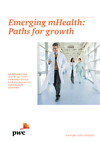 In developing this report, commissioned by PwC, the Economist Intelligence Unit conducted two surveys in ten countries: Brazil, China, Denmark, Germany, India, South Africa, Spain, Turkey, the UK and the US. The first survey asked 1,027 patients - with a broad distribution of economic backgrounds, ages, levels of education and states of health - about their opinions on various aspects of mHealth. The second survey queried 433 doctors and 345 executives from payer organisations. The respondents in the doctor group were drawn from the public sector (46%) and the private sector (49%) or were independent physicians (5%). The group is more urban (67%) than suburban (24%) or rural (10%), with 45% practicing in primary care, 45% in secondary care and 10% in tertiary care. The executives from payer organisations responding to the survey are roughly evenly divided between the public and the private sector, with 55% C-suite or above.
In developing this report, commissioned by PwC, the Economist Intelligence Unit conducted two surveys in ten countries: Brazil, China, Denmark, Germany, India, South Africa, Spain, Turkey, the UK and the US. The first survey asked 1,027 patients - with a broad distribution of economic backgrounds, ages, levels of education and states of health - about their opinions on various aspects of mHealth. The second survey queried 433 doctors and 345 executives from payer organisations. The respondents in the doctor group were drawn from the public sector (46%) and the private sector (49%) or were independent physicians (5%). The group is more urban (67%) than suburban (24%) or rural (10%), with 45% practicing in primary care, 45% in secondary care and 10% in tertiary care. The executives from payer organisations responding to the survey are roughly evenly divided between the public and the private sector, with 55% C-suite or above.
In addition, the research included extensive desk research and 20 in-depth interviews of senior executives from healthcare providers and payers, technology and telecommunications companies and industry organisations, as well as leading experts from academia, think-tanks and non-governmental organisations.
Finally, the EIU commissioned internal reports on mHealth for nine of the countries covered by the survey from its country experts.
Download: Emerging mHealth: Paths for Growth (.pdf, 1.974 KB).
Download from eHealthNews.eu: Emerging mHealth: Paths for Growth (.pdf, 1.974 KB).